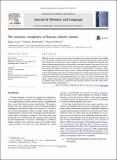The syntactic complexity of Russian relative clauses
Author(s)
Levy, Roger; Fedorenko, Evelina; Gibson, Edward A.
DownloadGibson_The syntactic.pdf (1.531Mb)
PUBLISHER_CC
Publisher with Creative Commons License
Creative Commons Attribution
Terms of use
Metadata
Show full item recordAbstract
Although syntactic complexity has been investigated across dozens of studies, the available data still greatly underdetermine relevant theories of processing difficulty. Memory-based and expectation-based theories make opposite predictions regarding fine-grained time course of processing difficulty in syntactically constrained contexts, and each class of theory receives support from results on some constructions in some languages. Here we report four self-paced reading experiments on the online comprehension of Russian relative clauses together with related corpus studies, taking advantage of Russian’s flexible word order to disentangle predictions of competing theories. We find support for key predictions of memory-based theories in reading times at RC verbs, and for key predictions of expectation-based theories in processing difficulty at RC-initial accusative noun phrase (NP) objects, which corpus data suggest should be highly unexpected. These results suggest that a complete theory of syntactic complexity must integrate insights from both expectation-based and memory-based theories.
Date issued
2013-06Department
Massachusetts Institute of Technology. Department of Brain and Cognitive SciencesJournal
Journal of Memory and Language
Publisher
Elsevier
Citation
Levy, Roger, Evelina Fedorenko, and Edward Gibson. “The Syntactic Complexity of Russian Relative Clauses.” Journal of Memory and Language 69, no. 4 (November 2013): 461–495.
Version: Final published version
ISSN
0749596X
1096-0821